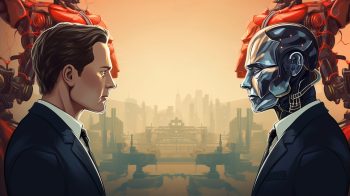
Written by: Izzat Najmi Abdullah, Journalist, AOPG.
Traditionally, digital twins have been used to create virtual replicas of machines or systems. But what if your digital twin wasn’t a factory machine, but you?

Eric Yuan, CEO of Zoom
Eric Yuan, the CEO of Zoom, envisions a future where the drudgery of endless meetings and overflowing email inboxes could be alleviated through the use of advanced Artificial Intelligence (AI). In an interview with The Verge, Eric shared how he and his team are developing digital-twin technology that aims to create digital clones of workers. These avatars could attend meetings, manage time-consuming tasks, and potentially transform work-life balance.
The very concept of human digital twins teeters between impressive and unsettling. While the idea may raise eyebrows, Zoom’s CEO Eric Yuan emphasises the potential of AI to revolutionise work-life balance. “I can send a digital version of myself to join so I can go to the beach,” Eric said, underscoring the potential for AI to free individuals from routine work tasks. This initiative, however, hinges on significant advancements in AI technology, which Eric acknowledges are still in development.
The concept is rooted in leveraging AI and Zoom Workplace to automate routine tasks, such as making phone calls, joining meetings, sending and managing emails, and responding to text messages. Eric’s goal is to minimise the time spent on these tasks, allowing people to reclaim their time for more creative projects, family, and community involvement. “Why not spend more time with your family? Why not focus on some more creative things, giving you back your time, giving back to the community and society to help others, right?” he proposed.
Despite the promising potential, Eric is realistic about the current limitations of AI. He predicts that it might take another five to six years for AI to be capable of handling around 90% of routine work tasks. However, Eric remains optimistic about the future, suggesting that while we are only at the beginning of this technological journey, significant progress is on the horizon. “I think in a few years, we’ll get there, but we’re just at the beginning,” he said, pointing towards a future where AI could significantly enhance productivity and personal well-being by taking over routine and mundane work tasks.
Can AI Replicate the Human Touch?
 The idea of digital clones raises both excitement and scepticism. On the one hand, the potential benefits are immense. Freeing ourselves from routine tasks could lead to greater productivity, enhanced creativity, and improved work-life balance.
The idea of digital clones raises both excitement and scepticism. On the one hand, the potential benefits are immense. Freeing ourselves from routine tasks could lead to greater productivity, enhanced creativity, and improved work-life balance.
On the other hand, there are inherent challenges and limitations to this vision. Real-time, nuanced human interaction is something AI cannot replicate. Eric himself acknowledges this, emphasising the irreplaceable value of face-to-face connections. “If I stop by your office, let’s say I give you a hug, and you shake my hand, right? I think AI cannot replace that,” he explains. The warmth and authenticity of human interaction, whether in a casual office visit or an intimate conversation at a coffee shop, are experiences that digital clones simply cannot mimic.
Moreover, the reliance on digital clones could lead to new forms of work-related stress and detachment. If our digital selves handle most of our work interactions, will we become disconnected from our colleagues and the essence of our jobs? The potential for increased isolation and the erosion of workplace relationships is a real concern.
Even worse, if AI can handle so much of what we do, what happens to us? Are we on the verge of becoming obsolete cogs in a machine, replaceable by our own digital shadows?
Eric’s optimism about the future is commendable, and his vision offers a fascinating glimpse into the possibilities of AI in the workplace. However, in all this talk about the rising use of AI, a nagging concern lingers. While AI can be a powerful tool to free us from the mundane, we must ensure it remains just that: A tool. The purpose of AI shouldn’t be to replace us but to augment our capabilities and create a future where human ingenuity and technological advancements work in harmony.
 (0)
(0) (0)
(0)Archive
- October 2024(44)
- September 2024(94)
- August 2024(100)
- July 2024(99)
- June 2024(126)
- May 2024(155)
- April 2024(123)
- March 2024(112)
- February 2024(109)
- January 2024(95)
- December 2023(56)
- November 2023(86)
- October 2023(97)
- September 2023(89)
- August 2023(101)
- July 2023(104)
- June 2023(113)
- May 2023(103)
- April 2023(93)
- March 2023(129)
- February 2023(77)
- January 2023(91)
- December 2022(90)
- November 2022(125)
- October 2022(117)
- September 2022(137)
- August 2022(119)
- July 2022(99)
- June 2022(128)
- May 2022(112)
- April 2022(108)
- March 2022(121)
- February 2022(93)
- January 2022(110)
- December 2021(92)
- November 2021(107)
- October 2021(101)
- September 2021(81)
- August 2021(74)
- July 2021(78)
- June 2021(92)
- May 2021(67)
- April 2021(79)
- March 2021(79)
- February 2021(58)
- January 2021(55)
- December 2020(56)
- November 2020(59)
- October 2020(78)
- September 2020(72)
- August 2020(64)
- July 2020(71)
- June 2020(74)
- May 2020(50)
- April 2020(71)
- March 2020(71)
- February 2020(58)
- January 2020(62)
- December 2019(57)
- November 2019(64)
- October 2019(25)
- September 2019(24)
- August 2019(14)
- July 2019(23)
- June 2019(54)
- May 2019(82)
- April 2019(76)
- March 2019(71)
- February 2019(67)
- January 2019(75)
- December 2018(44)
- November 2018(47)
- October 2018(74)
- September 2018(54)
- August 2018(61)
- July 2018(72)
- June 2018(62)
- May 2018(62)
- April 2018(73)
- March 2018(76)
- February 2018(8)
- January 2018(7)
- December 2017(6)
- November 2017(8)
- October 2017(3)
- September 2017(4)
- August 2017(4)
- July 2017(2)
- June 2017(5)
- May 2017(6)
- April 2017(11)
- March 2017(8)
- February 2017(16)
- January 2017(10)
- December 2016(12)
- November 2016(20)
- October 2016(7)
- September 2016(102)
- August 2016(168)
- July 2016(141)
- June 2016(149)
- May 2016(117)
- April 2016(59)
- March 2016(85)
- February 2016(153)
- December 2015(150)
